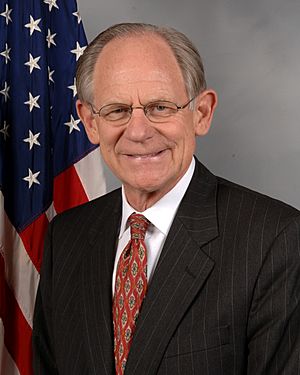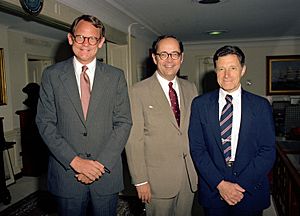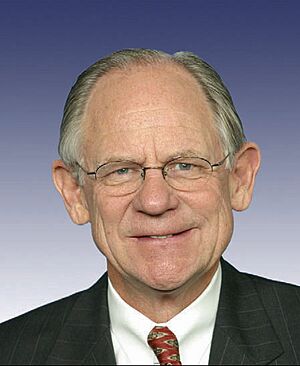Mike Castle facts for kids
Quick facts for kids
Mike Castle
|
|
|---|---|

Official portrait, 2006
|
|
| Member of the U.S. House of Representatives from Delaware's at-large district |
|
| In office January 3, 1993 – January 3, 2011 |
|
| Preceded by | Tom Carper |
| Succeeded by | John Carney |
| 69th Governor of Delaware | |
| In office January 15, 1985 – December 31, 1992 |
|
| Lieutenant | S. B. Woo Dale E. Wolf |
| Preceded by | Pete du Pont |
| Succeeded by | Dale E. Wolf |
| 20th Lieutenant Governor of Delaware | |
| In office January 20, 1981 – January 15, 1985 |
|
| Governor | Pete du Pont |
| Preceded by | James D. McGinnis |
| Succeeded by | S. B. Woo |
| Member of the Delaware Senate from the 1st district |
|
| In office January 7, 1969 – January 4, 1977 |
|
| Preceded by | Russell Dineen |
| Succeeded by | Harris McDowell III |
| Member of the Delaware House of Representatives from the 6th district |
|
| In office January 3, 1967 – January 7, 1969 |
|
| Preceded by | Frank Parisi |
| Succeeded by | George Hering |
| Personal details | |
| Born |
Michael Newbold Castle
July 2, 1939 Wilmington, Delaware, U.S. |
| Died | August 14, 2025 (aged 86) Greenville, Delaware, U.S. |
| Political party | Republican |
| Spouse |
Jane DiSabatino
(m. 1992) |
| Education | Hamilton College (BS) Georgetown University (LLB) |
Michael Newbold Castle (born July 2, 1939 – died August 14, 2025) was an important American politician and lawyer. He served as a U.S. Representative for the state of Delaware from 1993 to 2011. He was a member of the Republican Party.
Before becoming a U.S. Representative, Mike Castle held several other important roles in Delaware. He was the Governor of Delaware from 1985 to 1992. He also served as Lieutenant Governor from 1981 to 1985. Earlier in his career, he was a member of the Delaware General Assembly, which is like the state's parliament, from 1967 to 1977.
Mike Castle represented the entire state of Delaware in the U.S. House of Representatives. This district is very old and has been around for a long time. He was the longest-serving U.S. Representative in Delaware's history. As of 2025, he was the last Republican to be elected Governor of Delaware and to represent the state in the U.S. Congress.
In 2009, Mike Castle decided to run for a seat in the United States Senate. This was a special election to fill a spot that became open when Joe Biden became Vice President. However, in 2010, Castle did not win the primary election for his party.
Contents
Early Life and Education
Michael Newbold Castle was born on July 2, 1939, in Wilmington, Delaware. His parents were Louisa Johnston and James Manderson Castle Jr. Interestingly, some of his very distant relatives included important historical figures like Benjamin Franklin. His father worked as a lawyer for a big company called DuPont.
Mike Castle went to Tower Hill School and graduated in 1957. After that, he studied economics at Hamilton College, earning his degree in 1961. Later, in 1964, he earned a law degree from Georgetown University Law Center in Washington, D.C. This allowed him to become a lawyer in Delaware and Washington, D.C.
Starting His Political Journey
After becoming a lawyer, Mike Castle worked at a law firm in Wilmington. He was a member of the Republican Party. His first public role was as a Deputy Attorney General for Delaware from 1965 to 1966.
In 1966, he was elected to the Delaware House of Representatives, which is part of the state's law-making body. After two years there, he moved to the Delaware Senate, serving for eight years. He even became the leader of the minority party in the Senate for a time.
In 1976, Mike Castle took a break from politics to start his own law firm. But he returned to public service in 1980. He was asked to run for Lieutenant Governor of Delaware. He won this election and served from 1981 to 1985. During this time, he worked on important issues like improving education.
Serving as Governor of Delaware

In 1984, Mike Castle was elected Governor of Delaware. He won easily and was re-elected for a second term in 1988. He was the last Republican to win a governor's election in Delaware.
As governor, one of his main goals was to improve the welfare system. He worked to make sure people received the help they needed in a better way. Mike Castle left his second term as governor a little early to become a U.S. Representative.
Serving in the U.S. House of Representatives
In 1992, Mike Castle became a U.S. Representative for Delaware. He was elected many times, serving until 2011. This was part of a plan sometimes called "the Swap." Mike Castle ran for the U.S. House seat, while the person who held that seat, Tom Carper, ran for Governor. This allowed both popular leaders to continue serving the state.
What a U.S. Representative Does
As a U.S. Representative, Mike Castle worked in Washington, D.C. He was part of important groups called committees. These committees focus on different topics like education and money matters. He helped make laws and decisions that affected people across the country.
Mike Castle was known for being a moderate Republican. This means he often tried to find common ground with people from different political parties. He worked on issues like protecting the environment and supporting community colleges. He also helped with research into new medical treatments.
His Work with Coins
Mike Castle had a special interest in numismatics, which is the study or collection of coins. He played a big role in creating several U.S. coin programs. He helped create the American Platinum Eagle coin. He also sponsored laws for the popular 50 State quarters program. These quarters feature designs from each state.
He also helped create the Sacagawea dollar and presidential dollar coins. Because of his work, he was sometimes called "The Coinage Congressman." He even wrote a law that allows the U.S. Treasury to make platinum coins in any amount. This law could be used in special situations to help the country's finances.
Health and Public Appearances
In 2006, Mike Castle had two minor strokes but fully recovered. He continued to win his elections comfortably. In 2009, his district was featured on a TV show called "Better Know a District" by Stephen Colbert.
2010 Senate Campaign
In 2010, Mike Castle ran to become a Republican candidate for a U.S. Senate seat. However, he lost in the primary election to another candidate. Even though he lost the primary, polls showed he was very popular with voters in Delaware.
During this time, Mike Castle also supported a law called the DISCLOSE Act. This law aimed to make it clearer how much money was being spent on political campaigns.
Town Hall Meeting
Mike Castle held a public meeting, known as a town hall, to talk about health care reform. During this meeting, some people in the audience expressed very strong opinions. Mike Castle calmly answered questions, even when some attendees disagreed loudly. This event was widely reported and showed how passionate people were about the topic.
Later Political Involvement
After leaving Congress, Mike Castle remained involved in politics. He was a member of a group called the ReFormers Caucus of Issue One.
During the 2016 presidential election, he first supported John Kasich but later endorsed Donald Trump. In 2021, he shared his thoughts on political events, describing some actions as "nonsense."
Personal Life and Death
On May 23, 1992, Mike Castle married Jane DiSabatino in Dover, Delaware. He passed away in Greenville, Delaware, on August 14, 2025, at the age of 86.
 | Delilah Pierce |
 | Gordon Parks |
 | Augusta Savage |
 | Charles Ethan Porter |


